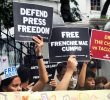Statement by Konsensya Dabaw
On the 40th day of Martial Law in Mindanao, President Rodrigo Duterte said, “it’s not dependent on the whim of the Supreme Court. Should I believe them? When I see the situation is still chaotic and you ask me to lift it? I will arrest you and put you behind bars.” He invoked the interest of the country as the reason for his uncompromising stance.
Was that specifically addressed to the Supreme Court which is expected to rule on petitions against Proclamation 216 this week? Or was it directed to anyone who would stand against Martial Law? Regardless, it came across as a threat to the separation of powers in government, the independence of the three branches, and the respect for legitimate dissent, which is a cornerstone of a healthy democracy.
The message delivered during the 50th anniversary celebration of Davao del Sur was but the latest of a series of statements that have had disturbing, frustrating, and menacing effects particularly on those critical of Martial Law.
We in Konsyensya Dabaw are disturbed by the series of messages from the President that promote militarism and put civilians at risk.
On May 31 he described Martial Law as one where “the military runs supreme in Mindanao…” But this is not consistent with the view of Fr. Joaquin Bernas, SJ, one of the framers of the 1987 Philippine Constitution, who said “martial law is essentially police power, but exercised by the executive with the aid of the military and in place of certain governmental agencies which for the time being are unable to cope with existing conditions in a locality which remains subject to the sovereignty.” Then on June 28, the President delivered a message to the military in relation to the Marawi crisis “do not hesitate to kill just because there are civilians there. It is the duty of civilians to flee or seek cover,” and that “we will face charges, sometimes massacre” but for as long as soldiers follow orders, the President “will see you through and assure you, you will be a free man.”
Earlier on May 27, President Duterte said to soldiers “if you rape three times, I’ll take the blame.” Although he later said he was being sarcastic, the President clearly missed out on the point that rape and other forms of sexual violence strike fear in any woman and their communities regardless of context; but in a war setting, threats of rape only highlight gender-based violence deeply rooted in society and which can resurface.
Irresponsible statements such as those cited encourage incorrigible and unreformed elements in the security sector who are looking for pretext to abuse their authority. Four leaders of peasant and human rights groups in Southern Mindanao were held for questioning at a Davao City checkpoint on June 28 for the ridiculous reason of being “suspicious.” Previously dismissed charges of qualified theft against one of them was also used to justify the interrogation. It was taken for granted that it was possible to hold and question them because it was Martial Law, and the privilege of the writ of habeas corpus had been suspended. That none of the four were connected to or associated with jihadist activities was completely set aside.
The mentality that makes an enemy that needs to be eradicated of anyone who questions or opposes the Philippine government has been the default and institutionalized mindset, and we are saddened that this has not been overcome in the time of Pres. Duterte. That we have high expectations of him cannot be helped; after all, he was an activist local chief executive who openly criticized national government’s handling of the 2002 Meiring case.
The statements are also a disservice to soldiers who are fighting jihadist and other terrorist forces. These jihadists have little regard for civilian lives, and treat women poorly and unjustly. It is the height of irony that the security sector is being motivated by the Commander-in-Chief to war against jihadists using the very same abhorrent practices that are despised by the peoples of the Philippines.
It is frustrating that the President flip-flops when it comes to expressing allegiance to the Constitution, which he is duty-bound to uphold. Before his July 1 diatribe on the “whim of the Supreme Court,” Pres. Duterte assured the public on June 10 that he would follow the ruling of the Supreme Court on the matter of Martial Law. He dismissed on June 28 those who called him to account on the basis of the Constitution, saying “do not give me that piece of paper. It doesn’t mean anything to me at all.”
These statements are neither necessary nor helpful in the fight against the jihadists whose violent activities and alleged “goal of removing Mindanao – starting with the City of Marawi, Lanao del Sur – from its allegiance to the Government” are supposed to be the reasons for Proclamation 216.
Finally, these statements do not address “erosion of faith and trust in government,” which the President said in his June 30, 2016 inaugural address was “the real problem that confronts us.” A government that sows fear through threats against fundamental institutions of the land, and civil liberties will not restore citizens’ faith and trust in it.
KONSYENSYA DABAW
Contact Person: Mags Z. Maglana





![[ANALYSIS] A different drug war](https://davaotoday.com/wp-content/uploads/2024/09/1000019103-110x100.png)




